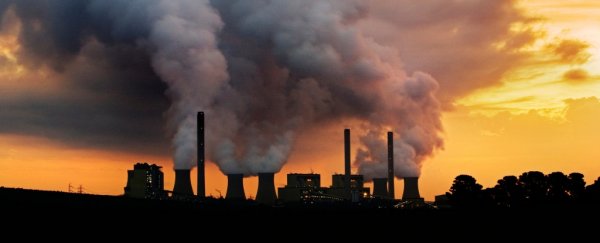The benefits of phasing out coal far outweigh the real-world costs, scientists say, and that's the case even when climate change is left out of the equation entirely.
Of all the fossil fuels in the world, coal is the biggest source of carbon dioxide, and its impacts on air pollution and public health are profound.
Since the beginnings of the Industrial Revolution, large-scale coal burning has cost lives, yet we've been struggling to kick it. Our global reliance on coal runs deep, so deep that even though we know it's bad for us, we continue to burn it at unprecedented levels.
Now, new computer simulations on the regional effects of phasing out coal suggest that continuing on this trajectory is a big mistake, with negative impacts not only on the environment and human health, but also the economy.
"We're well into the 21st century now and still heavily rely on burning coal, making it one of the biggest threats to our climate, our health and the environment," says Sebastian Rauner who researches climate impacts at the Potsdam Institute for Climate Impact Research (PIK).
"That's why we decided to comprehensively test the case for a global coal exit: Does it add up, economically speaking? The short answer is: Yes, by far."
The simulation the team has created incorporates information on the full extent of a 'coal exit' scenario, accounting for air pollution as well as the impact on the energy sector as a whole.
Using this thorough modelling, researchers have now examined the direct and indirect effects of three different scenarios: one, where we meet our current emission-cutting pledges by 2030; another, where we limit global temperature rise by the end of the century to 2 °C through carbon pricing; and a third, where we almost completely phase out coal by 2050.
This, of course, would be a substantial transformation of the energy system as we know it, but it may well be worth it.
Monetising the environmental and human health costs for the first time - including how much it would cost to re-wild areas and invest in transforming our energy systems - the authors have come to a stunning 'no-regret' decision.
Cutting off our reliance on coal will be hugely beneficial for most regions in the world, even when you don't take into account the global benefits of slowing down climate change.
In the simulations, the effects on air pollution in the coal exit scenario are at almost similar levels to the 2 °C scenario, improving global public health exponentially, especially in Asia.
In fact, in almost all regions of the world, the direct policy cost of exiting coal was nothing compared to the human health and environmental benefits that will be reaped come 2050.
Only sub-Saharan Africa, Latin America and Japan faced higher costs than benefits, and the authors think that might be because air pollution isn't as much of a problem in these parts.
Under the scenario where nations put a price on carbon to limit a temperature rise to 2 °C, a somewhat scattered picture emerges. Asia benefits from improved air quality, while Europe, Japan, and the US save on policy costs. The rest of the world, however, falls short of reaping the same direct societal benefits.
But keep in mind, that's only for regional effects. The minute we zoom out and consider climate change on a global level, everyone appears to win.
"We find that, based on all countries' current climate pledges under the Paris Agreement, humanity is so far not on track to keep global warming below 2 degrees," says Rauner.
"Yet, if all countries would introduce coal exit policies, this would reduce the gap to fulfilling the goal by 50 percent worldwide. For coal-heavy economies like China and India, quitting coal would even close the gap by 80-90 percent until 2030."
The authors argue exiting coal is a particularly valuable strategy going forward, because it reduces carbon dioxide emissions at a relatively low cost while also reaping huge local benefits, such as a reduction in air pollution.
Still, even then, coal is just a start, or, as the authors say, a "crucial early entry point." Phasing out our use of it is a way to buy us some time so we can create further climate policies that turn us away from other fossil fuels and towards more renewable forms of energy. Exiting coal is not a solution to the whole problem.
"[A] holistic response to the climate and environmental crisis will eventually have to achieve almost full-scale decarbonization of power supply," the authors conclude, "and thus also entail a deep reduction of not only coal but also oil and gas and address non-electric energy demands in transportation, buildings and industry sectors as well as resource efficiency."
The study was published in Nature Climate Change.
